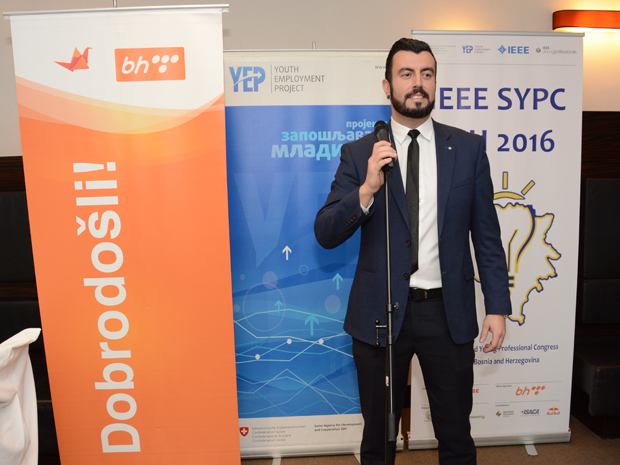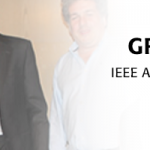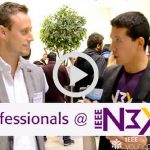IEEE The Institute: Changing Mind-sets at the IEEE Student and Young Professionals Congress
by Eddie Custovic
It’s now been more than a month since the IEEE Student and Young Professional Congress was held in Sarajevo, Bosnia and Herzegovina, and since then, my colleague IEEE Member Aleksandar Mastilovic [below] and I [above] have reflected on this historic and highly impactful event. Aleksandar is the former chair of IEEE Young Professionals group in Bosnia and Herzegovina and secretary of the IEEE Communications Society chapter in Bosnia and Herzegovina.
We came away believing that in order to spark change in the youth of a country still plagued by postwar ethnic division and with few opportunities, they need to be empowered to think like entrepreneurs. But to do that, they need inspirational figures to look up to and aspire to be, as well as form a connection to global leaders and be provided with resources to create a positive change in society.
Even though it’s been more than 20 years since the war ended, Bosnia and Herzegovina still has a complicated political viewpoint. Progressive ideas are often limited by political issues. The IEEE Bosnia and Herzegovina Section, its technical society chapters, and its affinity groups are also affected by these political considerations. However, the congress managed to unite the ethnic groups by focusing their attention on things that matter to all of them: economic development, technology, leadership, and career opportunities.

Aleksandar Mastilovic
MOTIVATIONAL SPEAKERS
The four-day event kicked off on 1 December. In addition to students and young professionals, also in attendance were deans of engineering from several of the country’s universities, industry representatives, and members of the media. I brought along 13 students from La Trobe University of Melbourne, Australia, where I am an academic and industry project coordinator.
The goal of the opening day was to provide the audience with inspirational life stories of individuals who live and work in Bosnia and Herzegovina, along with those who were born there but became successful in another country.
The event started off with a keynote address from 2017 IEEE President Karen Bartleson.
Keynote speaker Ceco Gakovic, an entrepreneur who was born in Sarajevo, built a successful career in San Francisco by developing Web and mobile platforms for some of the world’s largest brands including the National Football League, National Geographic, HBO, and NBC Universal.
“When people say ‘It can’t be done,’ I am always the one who likes to challenge that statement and prove them wrong,” Gakovic said. “A solution to the problem exists: It is about being creative and persistent that drives solutions. That is what I want young people in Bosnia and Herzegovina to walk away with from this congress.”
Kemal “Ken” Kujundzic provided an overview of innovation in the IT sector and outlined the countless cybersecurity jobs that will be created as a result of living in a connected world. Kujundzic was born in Chicago but draws his roots from Herzegovina. He is the senior vice president for sales and business development at ISACA, an association for IT governance professionals, based in Chicago.
“I was drawn to this congress because I enjoy helping others,” he said. “The young people in this country need a helping hand in realizing their potential. I am glad that I can pass on my experiences to these enthusiastic young professionals.”
Kenan Huskovic, the executive vice president of Modern Niagara, one of the largest building services companies in Canada, told attendees he thought he was destined to become a professional footballer but instead ended up studying mechanical engineering at the University of Toronto.
“There are so many opportunities in life,” Huskovic said. “When I was asked to attend this event and pass on my knowledge to these young, aspiring entrepreneurs, there was no hesitation.”
It was incredible to see the connection he made with attendees and his promise to students that they could personally contact him for career advice.
On the local front, IEEE Member Almir Badnjevic, director of Verlab, a medical devices verification laboratory in Sarajevo, provided insights into how one can succeed in the country. He was able to secure a large amount of funding from Fluke Corp. of Everett, Wash. The company designs, develops, manufactures, and sells commercial electronic test and measurement instruments for scientific, service, educational, industrial, and government applications.
“There are vast opportunities right here in Bosnia and Herzegovina, but young people have to realize that if they want something, they have to go and get it,” Badnjevic said. “This congress is an excellent platform for networking. There are many world-leading experts here who want to help young people succeed.”
Another inspirational presentation was delivered by Josip Balen, founder of the IEEE madC [mobile applications development content]. He told attendees, “When you are trying to innovate, it is OK to fail. We learn from failures. Failing while doing something you love is OK because you will get up and keep going.”
LENDING A HAND
During dinner, I had the pleasure of introducing the Bosnia and Herzegovina Futures Foundation, which I founded in late 2015 to meet the needs of disadvantaged students in the country. Its mission is to provide education and technology access to talented but disadvantaged young people. The foundation received several hundred applications for scholarships, and at the congress I announced that the foundation would entirely fund scholarships for two disadvantaged female students to study engineering for 12 months in Sarajevo: Adna Cosic and Kristina Mladjenovic.
During the dinner, the students and young professionals took part in a research competition in the form of a poster session. My foundation awarded Dalibor Dzumic first place for his project, Arrows System, which enables mind control of a wheelchair. Jasna Nuhic received second place for her project, Conversion of Plastic Waste to Fuel.
At the conclusion of the evening, I was approached by a student who said, “We always read stories and watch TV programs about individuals like you, but to have you here, speaking to us and interacting with us, is unreal.
“To us, you all appear to be Hollywood stars in the world of engineering, technology, and business. It is inspirational but also incredible to have you here, to know that you are real and have devoted time to help us.”
Read the full article on IEEE The Institute here.






